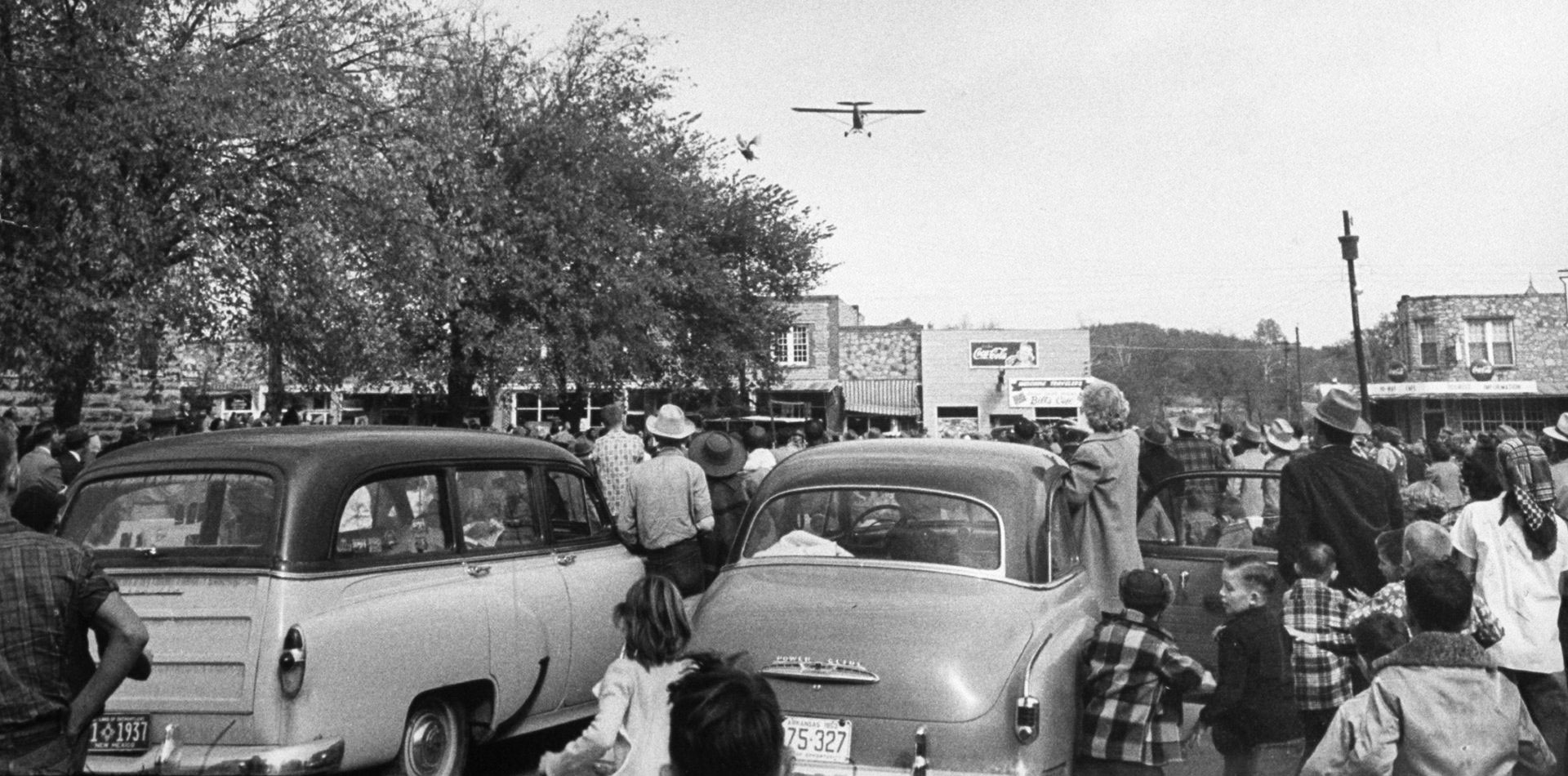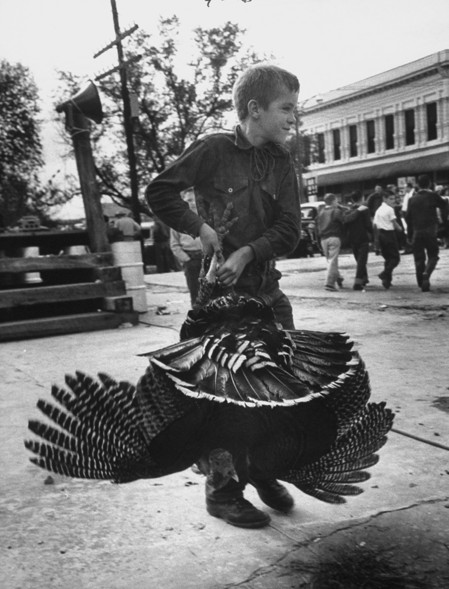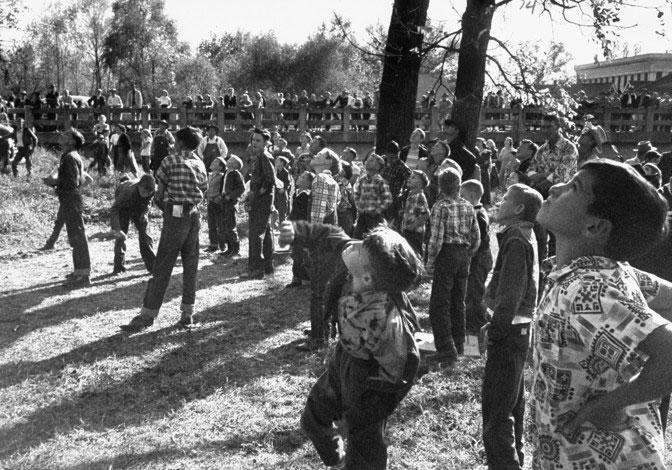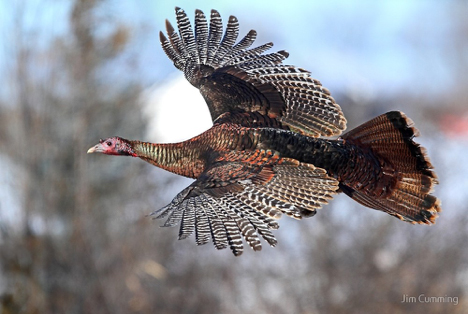Yellville, Arkansas Turkey Trot Festival:
What Happened in October 2018?

Wallace Kirkland / The Life Picture Collection / Getty
“A Thanksgiving story about the limits of human empathy.”
- The Atlantic
For about seventy years, since the 1940s, the rural town of Yellville, Arkansas in the Ozarks has dropped live turkeys from an airplane as part of its annual October Turkey Trot Festival. Most years, the Yellville Area Chamber of Commerce has either sponsored the “turkey drop” or let it be done unofficially. This year, however, as we reported in the Summer issue of Poultry Press, the Mid-Marion County Rotary Club assumed sponsorship of the festival, “but only if no live turkeys are on the premises or dropped from airplanes,” Rotary Club president elect Stan Duffy told reporters.
In April, the Chamber of Commerce announced it would no longer sponsor the festival, because the bad publicity generated by animal activists had become “detrimental to local businesses.”
So this year, October came and went with no word about the festival.
But in November, an article about the Yellville “turkey drop” was published on The Atlantic magazine’s website. In “Tossing a Bird that Does Not Fly Out of a Plane,” journalist Annie Lowrey describes her visit to this year’s festival, where “much to the dismay and consternation of many locals – there are no live turkeys. None in a cage towed behind a pickup. None thrown from the courthouse roof. None pitched off the bandstand and picked up by screaming teenagers. And none dropped out of an airplane.”

A boy crosses the square toting a turkey he caught in the kids' scramble. (Wallace Kirkland / The Life Picture Collection / Getty)
Linking to a United Poultry Concerns internet post dated October 14, 2015, in which we quoted from the December 5, 1989 National Enquirer photo-article, “Helpless Birds Crippled & Killed in Festival of Death,” Lowrey cites the documentary evidence and eyewitness testimonies of what happens “when you drop a turkey from hundreds of feet in the air. The panicked animals try to right themselves. Some catch a gust. Others do not. Some die when they hit the ground. Others survive with broken bones. Yet others are grievously injured when they are fought over by local kids. Some perish of apparent shock.”
Many Ozark residents work in poultry slaughter plants, into which Lowrey provides a glimpse of the ongoing human brutality and animal agony. Residents say they don’t see why animal activists focus on the turkey drop, affecting only a few turkeys, compared with the thousands of turkeys being slaughtered every day for meateaters, many of whom may oppose dropping turkeys from an airplane, while defending or not caring about what turkeys endure to be eaten.
The “limits of empathy” in most people include her own attitude, Lowrey writes. In essence, the conundrum boils down to: “The Turkey Trot is a carnival of disgusting and tasteless excess, but Thanksgiving is just Thanksgiving.”
Tucked in the article is Lowrey’s moving account of meeting a turkey in Yellville named George, who survived being thrown from a plane and now lives with a family who loves and respects him. George’s companion, Paul, survived the airplane ordeal only to die soon after reaching this haven of peace, and George has suffered emotionally from the loss of his friend.
Lowrey’s treatment of this sadness is sensitive but also rather mocking, as if her own sensitivity and the feelings of a turkey or any “animal” cannot or should not be taken too seriously. Most people, it seems, can care about a single animal or two, but not about thousands or millions of them. Yet the “limits of empathy” theory is ambiguous, since learning to care about one animal has led many people to care about all the “anonymous” ones as well.
Though no turkeys were visible at this year’s festival, Keith Edmonds of the Chamber of Commerce told Lowrey afterward, “You know, there were actually turkeys released from a plane this year. It was just kept quiet, I guess. Happened on Friday, They released on the south end of the city limits and I don’t know for sure if or how many were released on Saturday.”

Children watch a boy climbing a tree to grab a turkey that landed in branches.
(Wallace Kirkland / The Life Picture Collection / Getty)
Lowrey: “Do you know anybody who might have either seen it happen or picked up the birds?”
Edmonds: “I just know about it from a Facebook post. No idea.”
This tip takes her to Yellville resident Wesley Shipman, who says, “Nothing was hurt or anything. I never even got out of my vehicle.”
Birds were not thrown from a plane this year, just off the back of a truck – a “small, private bird-throwing event for devoted locals.”
Shipman, “It’s nothing official, so everybody goes away happy.”
Not happy.
Butterball is constructing a huge new turkey slaughter plant just outside of Yellville. As long as people eat turkeys and other farmed animals, there will always be “Hellville” including the types of “sports” that arise instinctively from cultures of slaughter.
It is not true that turkeys can’t fly.

The Traumas Felt By a Turkey Being Thrown From an Airplane
It is not true that turkeys per se can’t fly. Wild turkeys can fly 50 MPH. A look at wild turkey photos shows them flying, not just “fluttering” through tree branches. The issue isn’t whether turkeys can fly; it’s that they don’t normally fly hundreds of feet above ground. It’s that being pushed out of an airplane is not only terrifying and unnatural for them, but that the air pressure of the plane overwhelms their ability to orient themselves. The plane’s roaring engine noise adds to the trauma these birds are experiencing. In addition, they are already in a state of chronic fear as a result of having been helplessly surrounded their entire lives by humans who despise and abuse them.
It is true that turkeys bred specifically for industrial breast meat production can’t fly due to their abnormal weight and related problems of physical disproportion and cardiopulmonary weakness, but they don’t appear to be the kinds of birds traditionally thrown out of airplanes in Yellville. Such turkeys would crash to the ground like a wingless creature, and be dead on arrival. — United Poultry Concerns